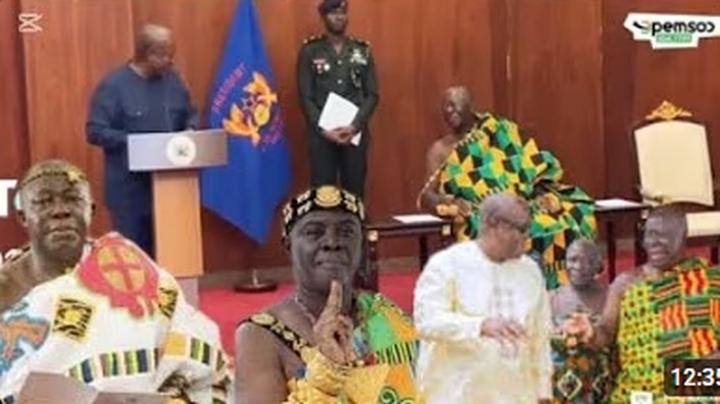President John Dramani Mahama has reportedly issued a strong caution to Dormaahene, Osagyefo Oseadeeyo Agyemang Badu II, regarding his remarks on Otumfuo Osei Tutu II. The warning comes amid ongoing tensions between the two traditional leaders, with Dormaahene making statements that have sparked controversy within Ghana’s chieftaincy circles.
Mahama, in his address, emphasized the significance of respecting the Asantehene’s authority, stating that Otumfuo is not just a traditional ruler but a key figure in Ghana’s governance and cultural heritage. He urged Dormaahene to exercise caution in his public statements, particularly those that could be perceived as undermining the authority of Otumfuo.
The former president’s remarks have reignited discussions about the role of traditional leaders in national affairs. While some believe chiefs should remain neutral in political matters, others argue that they have a responsibility to speak on governance issues affecting their communities.
This latest development adds to the historical tensions between the Ashanti and Bono traditional councils, with past disagreements over territorial influence and leadership roles. As the debate continues, many Ghanaians are calling for unity and mutual respect among traditional rulers to preserve the integrity of the chieftaincy institution.
Mahama’s warning comes at a time when traditional leadership is increasingly intersecting with political discourse. The Dormaahene’s comments about Chairman Wontumi and his call for legal action against him have drawn mixed reactions, with some supporting his stance while others see it as an overreach of his traditional role. Otumfuo, in response, has firmly rejected Dormaahene’s position, describing it as hypocritical and divisive.
The Asantehene has long been regarded as a stabilizing force in Ghana’s traditional leadership, often intervening in national matters with wisdom and diplomacy. His influence extends beyond the Ashanti Kingdom, making his leadership a crucial pillar in Ghana’s governance structure. Mahama’s remarks reinforce this perspective, highlighting the need for chiefs to maintain decorum and avoid statements that could fuel unnecessary conflicts.
Observers note that the ongoing exchanges between Dormaahene and Otumfuo reflect deeper historical and territorial disputes that have persisted for generations. While both leaders wield significant influence, their public disagreements risk creating divisions among their followers. Some analysts argue that a more diplomatic approach is needed to resolve these tensions, ensuring that traditional leadership remains a unifying force rather than a source of conflict.
As the situation unfolds, many are watching closely to see whether Dormaahene will respond to Mahama’s caution or whether efforts will be made to de-escalate the tensions. The role of traditional rulers in modern governance continues to be a subject of debate, with calls for a clearer framework on their engagement in political matters. For now, Mahama’s warning serves as a reminder of the delicate balance between tradition and politics, urging leaders to act with wisdom and restraint.
